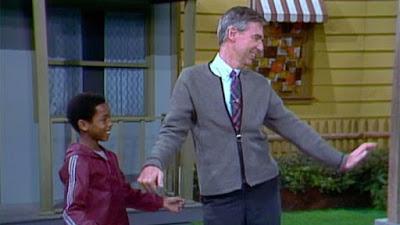Format: DVD from Cortland Public Library on rockin’ flatscreen.

Most of my reviews on this site run between 750 and 1000 words. I have a feeling that Won’t You Be My Neighbor? is going to be a lot shorter than that. This is not because I don’t have something to say about the movie or because it isn’t worth talking about. Instead, it’s because this is the sort of movie that you’re either going to be drawn to or you are not, and there’s not going to be a great deal of middle ground. You’re either going to be enamored of Fred Rogers and the philosophy he seemed to live with every fiber of his being, or you’re not.
On the surface, Fred Rogers would seem to be anathema to me. I am open about my lack of religious belief and falling away from the church; Rogers was an ordained Presbyterian minister. Where I can have a temper that does me no credit, Rogers was a man of calm and peace. He appears by all accounts and by everyone who knew him to be a genuinely good man as well as someone overflowing with true kindness. I recently told someone that, while I strive to be a good person as much as I can, I find that I am frequently not a nice one. I don’t always “person” very well, and Fred Rogers may well have been the best at personing in the last century.
But here’s the thing: Fred Rogers exemplified everything that his religion claims to have been. While we live in a world filled with the Jerry Falwell Jr. types who seem to think Jesus would have cut food stamps and strapped on an AR-15, Fred Rogers lived in a way that treated every person like they were the most important person in the world to him. Jesus, but watching this film is like staring at the sun. It’s so pure and bright that it hurts.
The film covers Rogers’s career, starting with a children’s program in Pittsburgh and his eventual move to Public Television and the creation of the show that would carry his name for decades. As a child, I watched a great deal of “Mister Rogers’ Neighborhood,” and I was never really aware of how progressive and subversive in many ways it was. Rogers, in the 1960s, was doing shows that touched on Bobby Kennedy’s assassination and the Vietnam war, addressing how children might see these events and deal with them. The bravery of that is staggering, as is the pure audacity.
While Won’t You Be My Neighbor? is the story of Rogers and his show and the many people who worked with him, it is also about the sort of drive that changes the world in real ways. Public Television likely wouldn’t exist without Fred Rogers, and that’s not an exaggeration. Rogers’s testimony to Congress almost single-handedly saved PBS. This was a man who viewed the world in one way—that every child had value simply by virtue of existing—and lived that in every way he could. It’s both inspiring and humbling. Try as I might, I will never have that kind of patience or genuine love for everyone.
Of course, not everyone loved him. Westboro Baptist Church picketed his funeral, and the film contains a clip of Fox and Friend douchecanoe Brian Kilmeade calling Rogers “evil” for telling children that they are special. It’s interesting that, had he been alive for either of those events, he would be the first to see what impact this might have on children. He’d be the first to see what was going on behind the eyes of the children forced to hold hateful signs, and likely the first to forgive Kilmeade’s douchebaggery.
See? There are things I can’t forgive. I’m no Fred Rogers. No one is.
Why to watch Won’t You Be My Neighbor?: To quote the Millennials, “the feels.”
Why not to watch: Fred Rogers was a better person than you…and me…and everyone we know.
